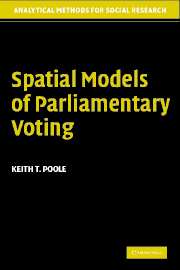Book contents
- Frontmatter
- Contents
- List of Tables and Figures
- Preface
- 1 Introduction
- 2 The Geometry of Parliamentary Roll Call Voting
- 3 The Optimal Classification Method
- 4 Probabilistic Spatial Models of Parliamentary Voting
- 5 Practical Issues in Computing Spatial Models of Parliamentary Voting
- 6 Conducting Natural Experiments with Roll Calls
- 7 Conclusion
- References
- Index
7 - Conclusion
Published online by Cambridge University Press: 24 November 2009
- Frontmatter
- Contents
- List of Tables and Figures
- Preface
- 1 Introduction
- 2 The Geometry of Parliamentary Roll Call Voting
- 3 The Optimal Classification Method
- 4 Probabilistic Spatial Models of Parliamentary Voting
- 5 Practical Issues in Computing Spatial Models of Parliamentary Voting
- 6 Conducting Natural Experiments with Roll Calls
- 7 Conclusion
- References
- Index
Summary
Overview
I conclude with short discussions of two topics. The first is the scientific status of the state of knowledge about geometric representations of human choice and judgment. I believe that research in this area, encompassing work in psychology, political science, economics, and other disciplines, is a classic example of scientific progress.
In the final section I discuss what I believe to be the important unsolved problems in the study of geometric models of legislative choice: specifying the sources of constraint, and determining precisely how the level of error interacts with the underlying geometry. I believe that these problems can be solved, and I hope the readers of this book take them as a challenge and push the field even further.
The Scientific Status of Geometric Models of Choice and Judgment
“[Textbooks] address themselves to an already articulated body of problems, data, and theory, most often to the particular set of paradigms to which the scientific community is committed at the time they are written” (Kuhn, 1962/1996, p. 136). This book, together with textbooks written for psychometricians interested in multidimensional scaling techniques (Borg and Groenen, 1997; Cox and Cox, 2001), researchers in item response theory (Andrich, 1988; Fischer and Molenaar, 1995; Embretson and Reise, 2000), and students of social choice (Sen, 1970; Austen-Smith and Banks, 2000; 2004) fits Kuhn's definition.
- Type
- Chapter
- Information
- Spatial Models of Parliamentary Voting , pp. 197 - 210Publisher: Cambridge University PressPrint publication year: 2005



